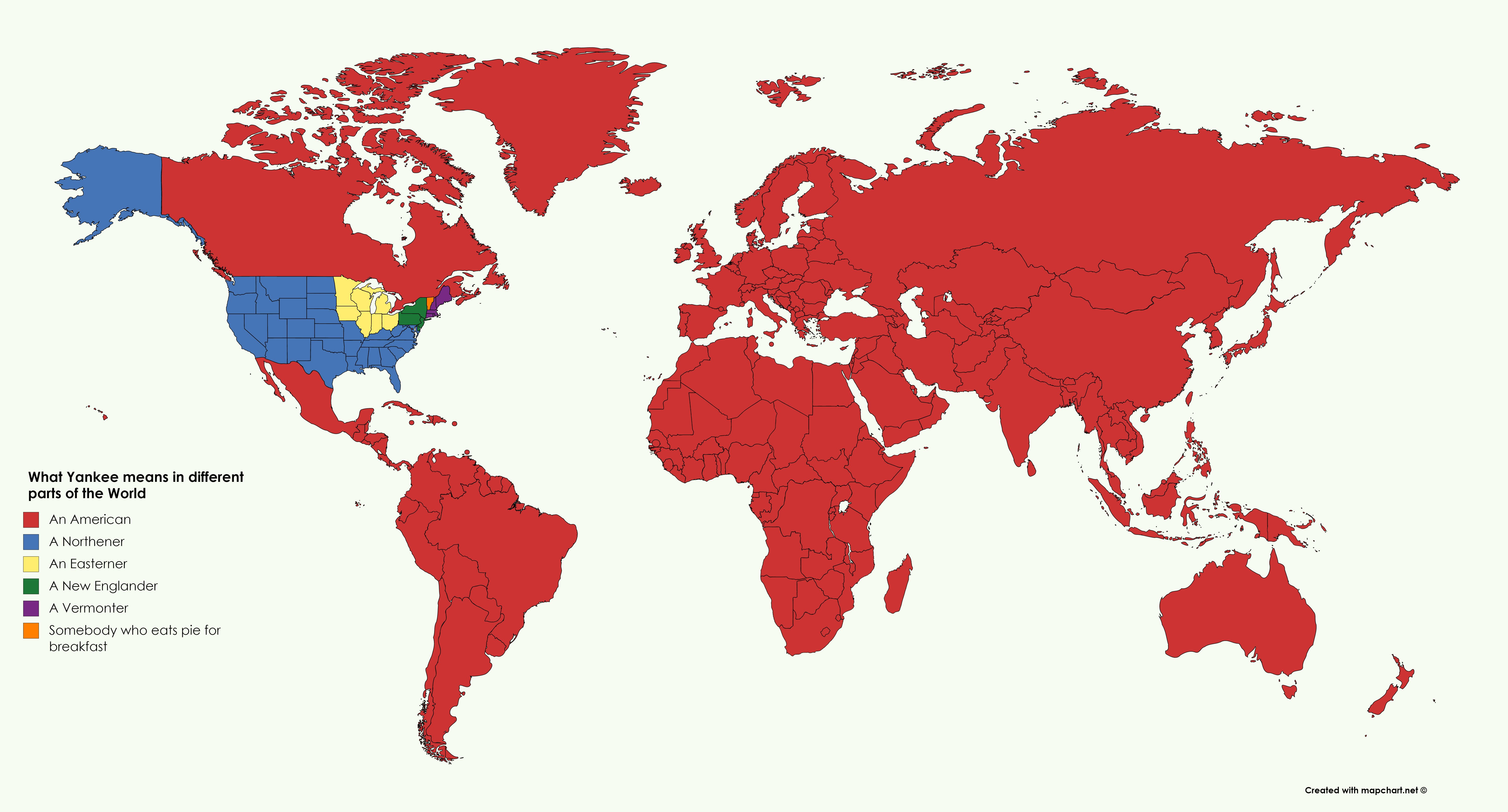From Spain here, when we want to speak about USA people we use the term “yankee” or “gringo” rather than “american” cause our americans arent from USA, that terms are correct or mean other things?
Being from the USA, I can confidently say “Yankee” is a term that is fairly neutral in meaning. People from the South states use it to refer to basically any American not from the South, and I get the sense people from the UK use it to refer to anyone from the USA.
In my experience, “Gringo” seems to be a term used by Spanish-speakers (even ones from North and South America) to refer to English speakers who think they’re better than everyone, so it appears to be a term with negative connotations
In my experience (as a Brit), people generally only refer to Americans as Yanks in a mildly pejorative way or if we’re taking the piss, otherwise it’s Americans.
Southerners are the same way. Nobody calls us yanks as a compliment
Texan here. Yankee is definitely not a neutral word to refer to everyone from the USA. Some people down here will fight you over it, but most would just give you a confused look.
I’ve always understood gringo to mean white person, especially one who can’t speak Spanish. The term is sometimes used in Mexican restaurants to let the staff know that you can’t deal with too many jalapeños.
Do Southerners use Yankee pejoratively to refer to northerners?
I’m afraid so. There are a lot of people still fighting our Civil War, the one that supposedly ended over 150 years ago. Even without those troglodytes, there is a distinct cultural difference between the North and South, as I think there is in many countries. We tend to rub each other the wrong way sometimes.
Old joke about the difference. Walk up to a Southerner’s house, and they say, “can I help you?” Walk up to a Yankee’s house, and it’s, “whaddya want?”
You’re god damn right we do.
The shithead in golf shorts in line ahead of you at Publix bitching out the cashier for not thanking him for letting her help him? The one who left where he’s from because he didn’t like it there and then wants here to be like where he’s from? That’s a Yankee, quite likely a halfback.
Username checks out lol
And don’t you forget it.
I’ve heard gringo is about language, primarily English (or another native tongue instead of Spanish). Not about being a whitey
Mexican upbringing here, it is most definitely a “Whitey” thing.
Thank you for the information. Guess I can’t joke about being a gringo lol
i believe Brits call Americans “yanks”
U.K. bloke here…I don’t use it personally, just because, but yeah we say it for anyone from the USA.
When I was about 10 or so someone local to me had a lawsuit because his colleagues called him Yankee and he claimed it was racism, fairly certain he won, but it was an obscure case.
In America, yankee means people from a particular part of America. But we use it here in Australia to mean any American. It’s especially fun when people from the south (that is…the south of the country America, not from the continent of South America) take offence at the term IMO.
We also use “seppo” which is an Australian shortening slang of “septic”, which is rhyming slang (of the kind used in both Australia and London, England) that comes via “septic tank” via “yank”.
Gringo seems strange to me. I thought that was a predominantly Latin American term for white people, and would apply equally well to Americans as Canadians as Australians as (of particular relevance to someone from Spain) English…but only the white of each, so it would seem to me it shouldn’t work as synonymous with “American” because it excludes African Americans, Asian Americans, etc. But I’m not Spanish or Latin American, so I might just be misunderstanding the word.
Edit: what yank means depending on where you are (allegedly):

Hispanic here, I grew up using “gringo” specifically for people from the U.S. despite skin tone.
Canadians are “Canadiense”, English are “Ingles” but United States? “Estadounidense”? It’s sort of like saying “United Statian” but arguably more “correct/proper”
Gringo is just much faster/easier to say.
That being said this can vary a little from one Latin-American country to another.
deleted by creator
Seppo, septic tank, yank. Love it! Cockney rhyming slang strikes again?
Australian rhyming slang in this case, but yeah, it functions in much the same way as Cockney.
Seppo is pretty common in the UK too, particularly in families with people in the forces.
Oh that’s really interesting. I would have sworn that o-shortening was a distinctly Australian thing. Do you have other words that you shorten like that? Do you know if that’s a specific term that Brits might have borrowed from Australia, or if it evolved naturally out of British slang?
Not sure where it came from but you can see it here under S - https://en.wiktionary.org/wiki/Appendix:Glossary_of_British_military_slang_and_expressions#S
As for other words, I don’t think we do quite so many as the Aussies but there are words like aggro, cheapo, wino, preggo used in every day speech.
I appreciate I’m nitpicking, but we all use rhyming slang. Probably changed over time.
Just say “idiots.” Source: USA citizen.
Burros como o caralho is Portuguese for USAians.
It translates to something like dumb as fuck.
Burgerlander
Marvelstani
That sounds like the name of a person from Docklands in Melbourne.
It’s a weird lacuna of the English language, there’s no official word for estadounidense.
In Italian we have an equivalent, Statunitensi, but Americani is probably used more often to mean the same thing
The reason for this is simple: the word in English is “American”. Because in English speaking countries, it is almost universally the case that we talk about the 7 continents. And in the rare case we talk about 6 continents, it’s from merging Europe and Asia (which, frankly, is blatantly a far superior model of the continents), not merging North America and South America.
So “America” unambiguously refers to the country, and there’s no need for estadounidense, any more than there’s a need for “commonwealthian” for someone from the Commonwealth of Australia.
What about Canada?
I think the point the previous user is getting at is that there is no continent of “America” in most English-speaking countries—there is North America and South America.
Canada is in North America but it’s not in “America,” which without the North/South prefix, will make most English-speaking people assume you mean the US and not the continent Canada and the US are on.
What about it?
They’re just Americans anyways
deleted by creator
I prefer the formal name in spanish of estadounidense (united-statistian) to American.
Being a native, a Yankee to me is a New Englander. My Spanish friend had to gently explain to me, “shut up, you’re all yanquis.”
Being a native from The South, “Yankee” to me means anybody from the area above the Mason Dixon line. Full disclosure, I’m not proud to be from The South. However, I do find many Yankees to be at least a little bit strange. So, the designation stands in my head.
Given that you’re the native, you should gently explain to the colonial that they are the ones who are wrong.
In Brazil, we use USians or Statesians
I used the second one on an academic paper and it went through.
I NEVER use “American”, because
America no es solo USA, papá esto es desde el Tierra del Fuego hasta el Canada
America no es solo USA
Nah, we often call them Americans too, despite them being like Canada’s trousers. Many (most? I’m not certain) Canadians know how Americans label themselves abroad and are okay being a separate group to avoid bad impressions. “eres Americano? No; soy Canadiense” or so.
But thanks for thinking of us. It’s great to be considered!
I use ‘yank’ a lot; sometimes Tank, as I’ve got a Brit friend ;-)
Thing is, it’s “United States of America”, much like “United States of Mexico” and, before 1968, “United States of Brazil”. So when they call themselves americans, they’re technically correct.
Ya tu sabé
Unfortunately the USAians are so dominant in the region of the Americas that they’ve coopted the term American for most people. My Columbian friend hates when we refer to USAians as Americans because he says “hey we were here first” 😆. But unfortunately that’s the way it is.
Yanks or Yankee Doodles is what we used to call them but they get rather upset these days when you call them that. I wouldn’t call them gringos because it just sounds unnatural for a Brit to say that seriously.
deleted by creator
In the USA, Yankee refers to mainly northeast US, including the New York City area. Western Americans would be neutral about being called that and you might piss off some southerners.
My exposure to the term gringo has mainly been that it refers to white Americans. I don’t know if you would call a black American gringo or how they would accept it.
Eh, NY has the Yankees sports team but they are not part of New England and I’d say a good portion of the country would say NY has no Yankees in it besides the team.
That’s the reason I didn’t say New England.
I think you should reread what I said, I don’t think your response makes sense vs my statement.
The term Yankee includes more than New England. That’s why I didn’t use the term New England while you did.
deleted by creator
Not too sure about gringo but I know yankee is correct, I hear that one a lot from folks I know in the UK.
There’s some weird linguistic drift where in the southern US, we call northerners yankees, even though in the rest of the world we’re all yankees. Now I’m curious how that started.
That Southern US usage dates back to at least the US civil war in the 1860s.
But yankee was used to refer to at least some people in what is now the US as early as the 1660s.
I dunno how true it is, but I’ve heard it gets even more specific once you’re in the north. I shared a map in another comment detailing the different meanings of it.
As for the etymology, apparently it goes back to Dutch settlers of New Netherlands, and may be connected to the name Janneke. It seems to have gone from being used by English settlers to Dutch settlers to being used in precisely the reverse at some point, and has at times meant either someone of English descent, of early Protestant descent, or other things.
It was used more generally by outsiders to refer to Americans as far back as the Revolutionary War (the song Yankee Doodle Dandy was originally making fun of Americans—macaroni being a sophisticated style of dress), so its history being used in that way actually predates the Civil War associations that I think many Americans would give it today.
So yeah, it really does have a fascinating linguistic history.
Also, weird…this is the second time in as many days I’ve had cause to look up Yankee Doodle Dandy.
As a Dutchie, I’ve heard it being an contraction of the names Jan and Kees, both are common names in Dutch
Yeah, that was another one of the theories. Linguists seem pretty sure it has something to do with Dutch, but are in disagreement over exactly how it came to be. (The “Janneke” example I gave above being, according to what I read, a diminutive form of Jan.)
I’m in Texas, so there is a lot of Mexican cultural exchange. Spanish was practically a second language in my public schools, and most people speak at least a little bit of spanglish.
When a Mexican calls an American a gringo, they’re not being nice. “Gringo” is typically used as a pejorative, to refer to a specific type of “mayo is too spicy and I’m afraid of people who have melatonin” white people.
Those deeply sleeping bastards
You can say USAmerican or US (as an adjective, e.g. US government) as a neutral demonym. “Yankee” and “gringo” have pejorative connotations, although I’m not Latin American so I don’t know what the connotations are among LatAm Spanish speakers. Also, my understanding of the word “gringo” as someone who lives in neither of the Americas is that it refers to specifically white people, not USAmericans in general. I’m not sure if I’ve understood the usage of the term correctly, but if other people have the same understanding, they may get confused if you call eg a Black USAmerican a gringo.













